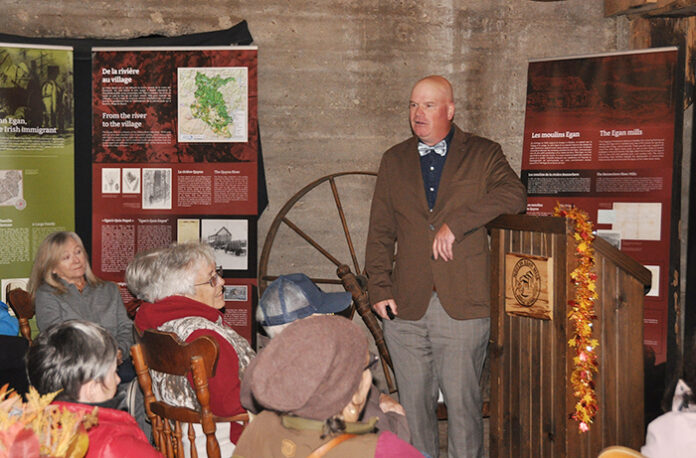Carl Hager
Published online October 22, 2025, at www.pontiacjournal.com.
MUNICIPALITY OF PONTIAC – Gord Graham, a retired history teacher from Pontiac High School in Shawville, spoke to a sold-out crowd at the Regional Association of West Quebecers’ (RAWQ) presentation Unanswered Questions of the Pontiac’s First Settlers, held at the Egan Mill in Quyon on Saturday afternoon, October 18. Graham titled his talk Fiddly Bits: Things I Wish I Could Have Asked. He reflected on the kinds of questions that came up over the years in his history classes — questions that often arose when discussing how early settlers made their living in what became Canada.
Graham explained that “fiddly bits” are small things people think they know or have heard of but lack clear answers for. Sometimes, he said, the explanations were common sense, yet never written down, leaving modern historians to speculate. These “fiddly bits” formed the theme of his presentation.
Specializing in the region’s economic history, Graham began by describing the first settlers who arrived in Quyon in the early 1800s. Loyal to the Crown, they came in search of land. Among them were Philemon Wright and John Egan. Wright, who founded Hull, initially aimed to build a farming community but soon turned to the timber trade when poor soils and distance from markets made agriculture difficult. The Napoleonic blockade of Britain created a strong demand for Canadian lumber, helping to establish the Ottawa Valley as a major centre for the timber industry. Egan, meanwhile, built the first mill in Quyon.
The first Irish Catholics to reach the Pontiac endured a perilous eight-week journey aboard so-called “coffin ships.” Vessels that had transported lumber to Europe returned to Canada filled with settlers seeking a new beginning. While the British government subsidized the migration to Lower Canada, conditions on some ships were harsh, with limited food and water. For many, land ownership in Canada offered freedom from the constraints of tenancy back home.
Daily life for early settlers was demanding. Women managed the cooking and livestock, while men handled tree cutting and farming. Each household relied on cooperation to meet its basic needs. Travel was equally arduous—a boat trip from Portage-du-Fort to Ottawa could take more than a day as it zigzagged along the Ottawa River. Stagecoaches later shortened the journey, and by 1895, a train covered the same distance in just three hours. Leisure time was a family affair, uniting children, parents, and grandparents. Fiddle music was at the heart of the festivities.
Graham’s lively, interactive presentation earned warm applause for his engaging exploration of the Pontiac’s past.
Photo – Retired history teacher Gord Graham speaks to a full audience at the Egan Mill in Quyon during the RAWQ’S presentation Unanswered Questions of the Pontiac’s First Settlers, held October 18. (CH)




